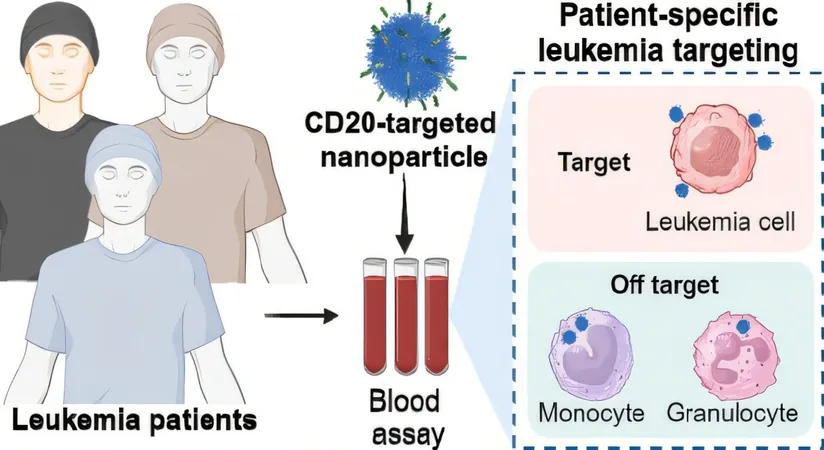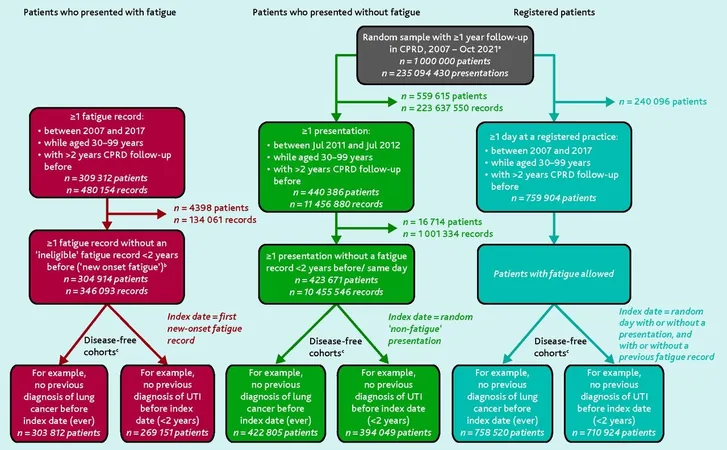
Revolutionary Blood Test Paves the Way for Safer, Tailored Cancer Treatments!
2024-12-16
Author: Emma
Introduction
In a groundbreaking study that could transform cancer treatment, scientists from RMIT University and the Doherty Institute have unveiled a revolutionary blood test designed to enhance the safety and efficacy of cancer therapies. This first-of-its-kind test allows medical professionals to evaluate how well various nanomedicines can target and kill cancer cells with just a drop of blood from patients suffering from leukemia, a serious form of blood cancer.
Study Background
Published in ACS Nano, the study highlights the pressing need for personalized cancer treatments, especially given that nearly one in two Australians will be diagnosed with cancer by the age of 85. The novel blood test provides a rapid assessment of polyethylene glycol (PEG) based nanomedicines, showcasing their therapeutic potential while minimizing adverse effects.
What are Nanomedicines?
Nanomedicines, tiny particles that are significantly smaller than human cells, are engineered to deliver drugs directly to cancer cells, aiming to protect healthy cells from damage. In Australia and the United States, several nanomedicines such as Doxil, Onpattro (patisiran), and Vyxeos are already approved for use, while countless others are in the pipeline, hinting at a promising future for cancer therapy.
Research Leadership
The research, spearheaded by Dr. Yi (David) Ju of RMIT University, in collaboration with Professor Stephen Kent of the Doherty Institute and Professor Constantine Tam from The Alfred, represents a huge leap in our understanding of how these advanced treatments interact with blood cells in leukemia patients.
Expert Insights
"This study provides crucial insights into individualized responses to nanomedicine therapies," said Dr. Ju from the School of Science. "By elucidating these differences, we are moving towards more personalized and effective treatment options."
The Study's Methodology
In their innovative approach, the researchers tested three distinct PEG-based nanomedicines on blood samples from 15 leukemia patients. Each sample was incubated with the nanomedicines, and after one hour at physiological temperature, the team gauged the effectiveness of the treatments in targeting both cancerous and healthy cells. This experimental setup paved the way for identifying which therapies would work best for different individuals.
Key Findings and Implications
Prior research indicated that elevated levels of anti-PEG antibodies—shaped by mRNA vaccines—could hinder future mRNA treatments including those for cancer. The latest results confirmed that the immune response of individual patients plays a pivotal role in determining the efficacy of these therapies.
The study revealed a concerning pattern: the higher the anti-PEG antibody levels in a person's blood, the less effective the nanomedicine treatment appeared to be against cancer cells. Notably, Doxil, a commonly used nanomedicine, showed susceptibility to these antibodies, leading it to inadvertently target healthy immune cells instead of cancerous ones.
Interestingly, despite the challenges posed by anti-PEG antibodies, Doxil still emerged as a viable treatment option for certain individuals. However, the standout performer among the tested formulations turned out to be the researchers' proprietary pure PEG nanoparticles, which showed promise as an effective targeted treatment against leukemia.
Looking Ahead: Personalized Cancer Therapy
The implications of this research extend far beyond leukemia treatment. The simplicity and effectiveness of the blood test could potentially revolutionize personalized oncology not only for blood cancers but also for solid tumors like breast and ovarian cancers.
"Understanding individual variations in immune response has the potential to catalyze safer and more effective treatments tailored to each patient's unique immune profile," said Professor Tam.
The research team is eager to align with pharmaceutical industry leaders to fast-track the clinical application of their findings, working towards a future where personalized nanomedicine can become a standard in cancer treatment.
Conclusion
Stay tuned as these innovations continue to unfold, offering hope for the millions affected by cancer around the world!









 Brasil (PT)
Brasil (PT)
 Canada (EN)
Canada (EN)
 Chile (ES)
Chile (ES)
 España (ES)
España (ES)
 France (FR)
France (FR)
 Hong Kong (EN)
Hong Kong (EN)
 Italia (IT)
Italia (IT)
 日本 (JA)
日本 (JA)
 Magyarország (HU)
Magyarország (HU)
 Norge (NO)
Norge (NO)
 Polska (PL)
Polska (PL)
 Schweiz (DE)
Schweiz (DE)
 Singapore (EN)
Singapore (EN)
 Sverige (SV)
Sverige (SV)
 Suomi (FI)
Suomi (FI)
 Türkiye (TR)
Türkiye (TR)